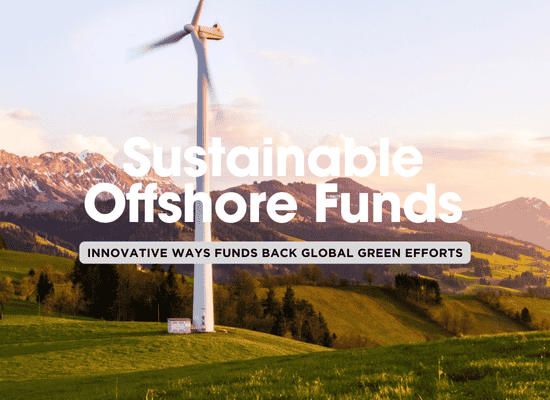10 Ways Offshore Funds are Leading the Sustainable Investing Revolution

Sustainable investing has become more than just a trend—it’s a fundamental shift in how investors allocate their capital. Offshore funds, with their global reach and flexibility, are playing a pivotal role in this movement. By integrating environmental, social, and governance (ESG) factors, these funds are not only delivering strong financial returns but also driving meaningful change worldwide. Here’s how offshore funds are shaping the future of sustainable investing.

1. Accessing Global ESG Opportunities 🌍
- What it means: Offshore funds provide investors with unparalleled access to ESG projects and markets across the globe. This diversification ensures that investors can support impactful initiatives in multiple regions, spreading risk while maximizing positive outcomes.
- How it works: These funds often invest in international projects like reforestation programs in Southeast Asia, sustainable agriculture in Africa, or green tech startups in Europe. By pooling resources globally, offshore funds enable large-scale investments that may not be feasible for individual investors.
- Why it matters: Global ESG access allows investors to back projects with the most significant environmental and social impact, regardless of location, ensuring their capital is making a difference on a global scale.
- Example: Offshore funds in Luxembourg and the Cayman Islands actively invest in renewable energy projects in developing nations, bridging the funding gap for critical infrastructure.
2. Supporting Renewable Energy Projects ⚡
- What it means: Offshore funds are pivotal in financing renewable energy projects, including wind farms, solar parks, and hydropower plants. These investments are key to transitioning to a greener economy.
- How it works: Through partnerships with renewable energy developers, offshore funds channel large-scale investments into clean energy initiatives. By utilizing tax-efficient jurisdictions, these funds maximize returns while minimizing costs for investors.
- Why it matters: Transitioning to renewable energy is critical for reducing global carbon emissions. Offshore funds enable projects that might otherwise lack sufficient capital, accelerating the shift to sustainable energy.
- Example: Offshore funds based in Bermuda have supported massive offshore wind farm developments in the North Sea, significantly contributing to Europe’s renewable energy capacity.
3. Facilitating Green Bonds 💸
- What it means: Offshore funds are instrumental in financing green bonds, which are debt instruments used to raise capital for environmental and climate-related projects.
- How it works: These funds connect investors with issuers, such as governments, corporations, or multilateral institutions, that need financing for renewable energy, sustainable transport, and pollution control projects. By offering tax advantages and access to international markets, offshore funds enhance the appeal of green bonds to global investors.
- Why it matters: Green bonds are a cornerstone of sustainable finance, enabling large-scale funding for climate mitigation and adaptation projects. Offshore funds amplify the reach and impact of these bonds by attracting diverse investors.
- Example: The Luxembourg Green Exchange (LGX), a leader in green finance, channels significant capital through offshore funds into green bonds for sustainable infrastructure in emerging markets.
4. Promoting Socially Responsible Investments (SRIs) ❤️
- What it means: Offshore funds are increasingly focusing on socially responsible investments (SRIs) that prioritize positive societal impacts alongside financial returns. These include projects related to affordable housing, healthcare, education, and clean water.
- How it works: By pooling resources from socially conscious investors, offshore funds direct capital into initiatives with measurable social benefits. These funds often collaborate with NGOs, development banks, and local governments to ensure the success of their investments.
- Why it matters: SRIs address critical global challenges, improving quality of life in underprivileged communities while fostering investor confidence in ethical finance.
- Example: Offshore funds in the Cayman Islands have facilitated investments in microfinance programs across Latin America, empowering small business owners and fostering economic development.
5. Encouraging Sustainable Infrastructure Development 🏗️
- What it means: Offshore funds are critical in financing sustainable infrastructure projects, such as eco-friendly buildings, clean transportation systems, and water treatment facilities.
- How it works: These funds pool resources to support large-scale projects that require substantial upfront capital. By leveraging tax-efficient jurisdictions, they attract global investors who might otherwise hesitate due to high costs or perceived risks.
- Why it matters: Sustainable infrastructure is essential for reducing carbon footprints and creating resilient communities. Offshore funds provide the necessary funding to develop these projects, ensuring they meet environmental standards.
- Example: Offshore funds based in Singapore have been pivotal in financing green building initiatives across Asia, incorporating renewable energy systems and energy-efficient designs.
6. Mitigating Risks Through Diversification 📈
- What it means: Offshore funds allow investors to diversify their portfolios across multiple sustainable asset classes, reducing risks while supporting various eco-friendly initiatives.
- How it works: These funds invest in a mix of projects, including renewable energy, sustainable agriculture, and conservation efforts. Diversification ensures that losses in one area can be offset by gains in another, providing stability and consistent returns for investors.
- Why it matters: Diversification minimizes exposure to regional or sector-specific risks, ensuring that capital continues to flow into sustainability efforts even during economic downturns.
- Example: An offshore fund in the British Virgin Islands invests simultaneously in wind farms in Europe, sustainable forestry in South America, and water conservation projects in Africa, balancing risks and maximizing global impact.
7. Enhancing Transparency Through ESG Reporting 📊
- What it means: Offshore funds are adopting rigorous Environmental, Social, and Governance (ESG) reporting standards to ensure transparency and accountability in their sustainable investments.
- How it works: ESG reports track the environmental and social impact of investments, measuring factors such as carbon emissions, resource efficiency, and community benefits. Offshore funds use these reports to communicate their impact to investors and stakeholders.
- Why it matters: Transparency builds trust among investors, encouraging more capital to flow into sustainable initiatives while holding funds accountable for their commitments.
- Example: Funds in Luxembourg, a leader in green finance, adhere to the EU’s Sustainable Finance Disclosure Regulation (SFDR), ensuring detailed ESG reporting on all sustainable investments.
8. Supporting Conservation Projects 🐾
- What it means: Offshore funds play a vital role in financing conservation efforts, such as protecting endangered species, restoring ecosystems, and combating deforestation.
- How it works: These funds collaborate with environmental organizations and governments to allocate capital toward projects with measurable ecological benefits. Investments often include purchasing conservation easements, funding reforestation initiatives, or protecting marine reserves.
- Why it matters: Conservation projects are critical for maintaining biodiversity and ecosystem health, which are essential for long-term sustainability. Offshore funds provide the scale and flexibility needed to make these efforts viable.
- Example: Offshore funds in Bermuda have supported large-scale marine conservation projects, safeguarding critical habitats for endangered species like sea turtles and coral reefs.
9. Backing Sustainable Agriculture Initiatives 🌾
- What it means: Offshore funds are channeling investments into sustainable farming practices, supporting eco-friendly agricultural development.
- How it works: These funds finance projects like organic farming, precision agriculture, and agroforestry, focusing on reducing environmental impacts while boosting yields. By leveraging offshore jurisdictions, they can pool international capital for global agricultural improvements.
- Why it matters: Sustainable agriculture not only addresses food security but also reduces greenhouse gas emissions, conserves water, and enhances soil health.
- Example: Offshore funds in Mauritius are investing in sustainable rice farming in Africa, using water-efficient irrigation and organic methods to increase production and minimize environmental impact.
10. Creating Impact Investing Opportunities 🌍
- What it means: Offshore funds are pivotal in enabling impact investing, where financial returns are coupled with measurable social or environmental benefits.
- How it works: These funds curate portfolios of high-impact projects, such as renewable energy, affordable housing, or clean water initiatives, and offer them to investors seeking dual-purpose returns. Offshore jurisdictions help streamline investments, reduce tax burdens, and enhance fund efficiency.
- Why it matters: Impact investing bridges the gap between profit and purpose, driving resources toward meaningful, sustainable change.
- Example: Cayman Islands-based funds have facilitated large-scale impact investments in solar energy projects in underserved regions, delivering electricity and improving livelihoods.
Offshore funds are uniquely positioned to lead the charge in sustainable investing. Their ability to pool global capital, minimize tax burdens, and diversify portfolios makes them powerful drivers of ESG initiatives. From renewable energy to sustainable agriculture and conservation projects, these funds are shaping a greener, more equitable future. By embracing transparency, supporting impactful projects, and encouraging global collaboration, offshore funds prove that profit and sustainability can go hand in hand.
Table Summary
| OffshoreOpen: 10 Ways Offshore Funds Lead Sustainable Investing | |||
|---|---|---|---|
| Strategy | What It Involves | Why It Matters | Real-World Example |
| Accessing Global ESG Opportunities | Investing in sustainable projects worldwide to diversify portfolios and amplify impact. | Enables funding for high-impact projects in developing and developed markets. | Luxembourg funds support renewable energy in Southeast Asia. |
| Supporting Renewable Energy Projects | Financing wind farms, solar parks, and other clean energy initiatives. | Accelerates the transition to a greener economy by scaling up renewable projects. | Bermuda-based funds back offshore wind farms in Europe. |
| Facilitating Green Bonds | Channeling investments into green bonds to finance climate-resilient infrastructure. | Funds large-scale environmental projects with measurable impact. | Luxembourg Green Exchange finances sustainable urban transport projects. |
| Promoting Socially Responsible Investments | Funding projects focused on affordable housing, healthcare, and education. | Addresses global challenges while delivering ethical financial returns. | Cayman funds back microfinance programs in Latin America. |
| Encouraging Sustainable Infrastructure Development | Investing in green buildings, clean transport, and water treatment facilities. | Supports eco-friendly growth and community resilience. | Singapore funds finance energy-efficient urban projects in Asia. |
| Mitigating Risks Through Diversification | Spreading investments across sustainable asset classes to balance risk and returns. | Ensures portfolio stability while supporting a range of eco-friendly projects. | British Virgin Islands funds invest in wind, forestry, and water projects. |
| Enhancing Transparency Through ESG Reporting | Publishing detailed reports on the impact of investments using ESG metrics. | Builds investor trust and ensures accountability for sustainability goals. | Luxembourg funds comply with the EU’s SFDR for ESG transparency. |
| Supporting Conservation Projects | Funding efforts to protect ecosystems, endangered species, and natural habitats. | Preserves biodiversity and combats deforestation and marine degradation. | Bermuda funds finance marine habitat conservation for coral reefs and sea turtles. |
| Backing Sustainable Agriculture Initiatives | Investing in eco-friendly farming practices, like agroforestry and organic methods. | Enhances food security while reducing environmental impacts. | Mauritius funds support sustainable rice farming in Africa. |
| Creating Impact Investing Opportunities | Combining financial returns with measurable social and environmental benefits. | Drives resources toward projects that balance profit and purpose. | Cayman funds back solar projects in underserved regions. |
